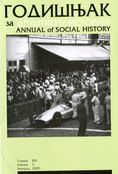Македонски опијум 1918–1941: О финансијским и политичким размерама феномена
Macedonian opium 1918-1941: About financial and political dimensions of the phenomenon
Author(s): Vladan Z. JovanovićSubject(s): History
Published by: Udruženje za društvenu istoriju
Keywords: opium; monopoly; trade; smuggling; Geneva Convention
Summary/Abstract: Yugoslav/Macedonian opium was of the highest quality in the world due to its rich content of morphine, but the Geneva Convention (1928) enacted rigorous restriction in opium trade and production worldwide. However, considering this profitable industry, many prominent Yugoslav politicians (senators, as well as deputies) took part in trading. This lucrative merchandise became the state monopoly, so Macedonian peasants and opium cultivators were obliged to sell their products discount. The industry started to wither, and went over into the jobbers1 hands. It appeared a big deal, considering the Yugoslav-Turkish cooperation that sufficed 43% of total world market. Finally, strong political connections have prevailed when the alkaloid factory was found in Skopje in the mid-1930s. The clues about Macedonian opium as a financial source of terrorist organization in Bulgaria (IMRO) were confirmed. Yugoslav borderers used to confiscate huge amounts of opium that was hidden in foodstuff. Besides, several illegal factories in Bulgaria started to smuggle opium derivatives to the German harbors, bound for the United States.
Journal: Godišnjak za društvenu istoriju
- Issue Year: XVI/2009
- Issue No: 3
- Page Range: 69-79
- Page Count: 11
- Language: Serbian

